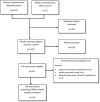Creating an Indigenous Māori-centred model of relational health: A literature review of Māori models of health
- PMID: 34046956
- PMCID: PMC8597078
- DOI: 10.1111/jocn.15859
Creating an Indigenous Māori-centred model of relational health: A literature review of Māori models of health
Abstract
Aims and objectives: Identify the key concepts, principles and values embedded within Indigenous Māori models of health and wellbeing; and determine how these could inform the development of a Māori-centred relational model of care.
Background: Improving health equity for Māori, similar to other colonised Indigenous peoples globally, requires urgent attention. Improving the quality of health practitioners' engagement with Indigenous Māori accessing health services is one area that could support improving Māori health equity. While the Fundamentals of Care framework offers a promising relational approach, it lacks consideration of culture, whānau or family, and spirituality, important for Indigenous health and wellbeing.
Design and methods: A qualitative literature review on Māori models of health and wellbeing yielded nine models to inform a Māori-centred relational model of care. We followed the PRISMA guidelines for reporting literature reviews.
Results: Four overarching themes were identified that included dimensions of health and wellbeing; whanaungatanga (connectedness); whakawhanaungatanga (building relationships); and socio-political health context (colonisation, urbanisation, racism, and marginalisation). Health and wellbeing for Māori is a holistic and relational concept. Building relationships that include whānau (extended family) is a cultural imperative.
Conclusions: This study highlights the importance and relevance of relational approaches to engaging Māori and their whānau accessing health services. It signals the necessary foundations for health practitioners to build trust-based relationships with Māori. Key elements for a Māori-centred model of relational care include whakawhanaungatanga (the process of building relationships) using tikanga (cultural protocols and processes) informed by cultural values of aroha (compassion and empathy), manaakitanga (kindness and hospitality), mauri (binding energy), wairua (importance of spiritual wellbeing).
Relevance to clinical practice: Culturally-based models of health and wellbeing provide indicators of important cultural values, concepts and practices and processes. These can then inform the development of a Māori-centred relational model of care to address inequity.
Keywords: Indigenous; cultural competency; cultural safety; fundamental care; literature review; nurse-patient relationship.
© The Authors. Journal of Clinical Nursing published by John Wiley & Sons Ltd.
Figures
References
-
- Arksey, H. , & O'Malley, L. (2005). Scoping studies: Towards a methodological framework. International Journal of Social Research Methodology, 8(1), 19–32. 10.1080/1364557032000119616. - DOI
-
- Barton, P. , & Wilson, D. (2008). Te Kapunga Putohe (the restless hands): A Maori centred nursing practice model. Nursing Praxis of New Zealand, 24(2), 6–15. https://www.nursingpraxis.org/242‐te‐kapunga‐putohe‐the‐restless‐hands‐a.... - PubMed
Publication types
MeSH terms
LinkOut - more resources
Full Text Sources
Other Literature Sources




